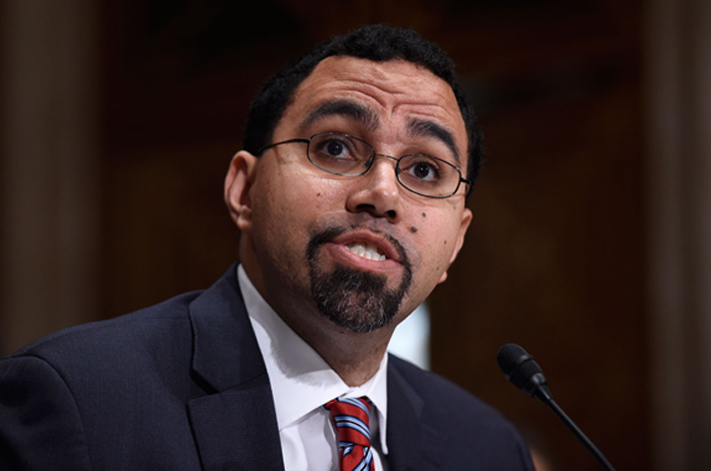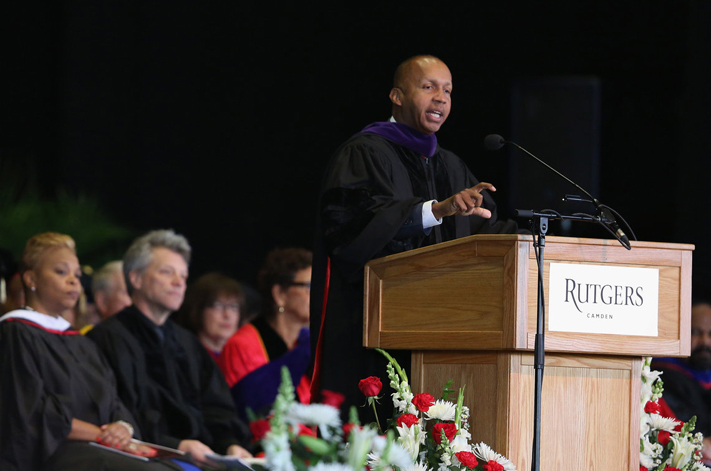Project Description
Originally Published on January 30, 2013. By Valerie Strauss. The Answer Sheet. Washington Post.
A nonprofit group released thousands of e-mails today and said they show how a foundation begun by Jeb Bush, the former Florida governor and national education reform leader, is working with public officials in states to write education laws that could benefit some of its corporate funders.
A call to the foundation has not been returned.
The e-mails are between the Foundation for Excellence in Education (FEE) and a group Bush set up called Chiefs for Change, whose members are current and former state education commissioners who support Bush’s agenda of school reform, which includes school choice, online education, retention of third-graders who can’t read and school accountability systems based on standardized tests. That includes evaluating teachers based on student test scores and grading schools A-F based on test scores. John White of Louisiana is a current member, as is Tony Bennett, the new commissioner of Florida who got the job after Indiana voters rejected his Bush-style reforms last November and tossed him out of office.
Donald Cohen, chair of the nonprofit In the Public Interest, a resource center on privatization and responsible for contracting in the public sector, said the e-mails show how education companies that have been known to contribute to the foundation are using the organization “to move an education agenda that may or not be in our interests but are in theirs.”
He said companies ask the foundation to help state officials pass laws and regulations that make it easier to expand charter schools, require students to take online education courses, and do other things that could result in business and profits for them. The e-mails show, Cohen said, that Bush’s foundation would often do this with the help of Chiefs for Change and other affiliated groups.
The e-mails were obtained by Cohen’s group through public record requests and are available here, complete with a search function. They reveal — conclusively, he said — that foundation staff members worked to promote the interests of some of their funders in Florida, New Mexico, Maine, Oklahoma, Rhode Island and Louisiana.
The Web site of the Foundation for Excellence in Education used to list some of their donors but no longer does and is not required to list all of its donors to the public under tax rules for 5013C organizations. However, it is known that the foundation has received support from for-profit companies K12 and Pearson and Amplify, as well as the nonprofit College Board.
There are strong connections between FEE and the conservative American Legislative Exchange Council (ALEC), according to the nonprofit Center for Media and Democracy:
Aptly named FEE, Bush’s group is backed by many of the same for-profit school corporations that have funded ALEC and vote as equals with its legislators on templates to change laws governing America’s public schools. FEE is also bankrolled by many of the same hard-right foundations bent on privatizing public schools that have funded ALEC. And, they have pushed many of the same changes to the law, which benefit their corporate benefactors and satisfy the free market fundamentalism of the billionaires whose tax-deductible charities underwrite the agenda of these two groups.
FEE and ALEC also have had some of the same “experts” as members or staff, part of the revolving door between right-wing groups. They have also collaborated on the annual ALEC education “report card” that grades states’ allegiance to their policy agenda higher than actual student performance. That distorted report card also rewards states that push ALEC’s beloved union-busting measures while giving low grades to states with students who actually perform best on standardized knowledge tests.
Here is some of what the e-mails released today by Clark’s group say, taken from the Web site of In the Public Interest:
- In New Mexico, FEE acted as a broker to organize meetings between their corporate donors and individual Chiefs.
- Maine moved the FEE policy agenda through legislation and executive order that would remove barriers to online education and in some cases would require online classes – including eliminating class size caps and student-teacher ratios, allowing public dollars to flow to online schools and classes, eliminate ability of local school districts to limit access to virtual schools.
- In Florida, FEE helped write legislation that would increase the use of a proprietary test (FCAT) under contract to Pearson, an FEE donor.
- Foundation for Excellence in Education CEO Patricia Levesque urged state officials to introduce SendHub, a communications tool, into their state’s schools. News reports indicate that Levesque’s boss, Jeb Bush, is an investor in SendHub.
Florida
- FEE staff sought legislation that would count the state test, known as FCAT, as more than 50% of the state’s school accountability measure. FEE staffer Patricia Levesque wrote to a state official that she had negotiated the related language with state legislators, who were now “asking for the following, which the Foundation completely supports: FCAT shall be ‘at least 50%, but no more than 60%’ of a high school’s grade.” Pearson, the company that holds the $250 million FCAT contract and sponsors FEE through its foundation, has an obvious financial stake in ensuring that FCAT continues to be at the center of Florida’s education system.
- Levesque writes, “I think we need to add a sec onto this bill to give you/the department authority to set a state‐approved list of charter operators or private providers so districts can’t pick poor performers to implement turnaround.” At least one FEE donor, the for-profit Florida-based Charter Schools USA, could benefit from being placed on such a state-approved list.
- Charter Schools USA also could benefit from a “parent trigger” law, the passage of which, as Nadia Hagberg of FEE wrote, was the goal of a partnership between Bush’s Florida-based organization (the Foundation for Florida’s Future) and Parent Revolution: “The Foundation for Florida’s Future worked closely with [Parent Revolution] throughout the process in Florida and they proved to be an invaluable asset.” Parent trigger, which failed to pass during Florida’s last legislative session, is a mechanism to convert neighborhood schools to charter schools.
Louisiana
- An April 26, 2011, e-mail indicates that Bush’s Foundation for Excellence in Education, through its Chiefs for Change project, had engaged John Bailey, a director of Dutko Grayling. CEO Patricia Levesque wrote to State Schools Superintendent Paul Pastorek:
- John Bailey, whom you met over the phone, will be on the call to provide an update on reauthorization discussions on the Hill. He is going to be on contract with the Foundation to assist with the Chiefs’ DC activities in light of Angie’s departure.
- Dutko has been accused of working with industry front groups in the past. For example, Dutko worked with AIDS Responsibility Project (ARP), an industry-supported effort described by an HIV/AIDS policy activist as a ‘drug industry-funded front group. ‘”
- There are records of the Foundation for Excellence in Education reimbursing Paul Pastorek and John White, the two men who led the state’s education department, for their travel to Orlando and Washington, D.C., for events sponsored by FEE and the Chiefs for Change.
Maine
- As the Portland Press-Herald has reported, the e-mails were evidence of “a partnership formed between Maine’s top education official and a foundation entangled with the very companies that stand to make millions of dollars from the policies it advocates.”
- FEE Deputy Director Deirdre Finn wrote, “We can definitely help develop an executive order,” referring to what became a February 2012 executive order by Gov. LePage directing his education commissioner to develop a plan to open the door to more cyber-schooling in Maine. The elements of the order originated with the Digital Learning Council, a group co-chaired by Bush and funded by FEE donors K12 Inc, the Pearson Foundation and McGraw-Hill.
- The Foundation for Educational Excellence also acted as a conduit for ALEC model legislation and policies. LePage’s order originated at ALEC, was tailored for Maine by the FEE and sent to Education Commissioner Stephen Bowen, who subsequently forwarded it to LePage to release unchanged. “Resolution adopting the 10 Elements of High Quality Digital Learning” is a model bill introduced by Arizona Sen. Rich Crandall at the 2011 ALEC Annual Conference.
- FEE provides its donors — including for-profit digital education companies — access to the chiefs. A draft agenda for the Excellence in Action 2011 Summit blocked off two hours for “Chiefs for Change donor meetings.” Another draft agenda for the meeting allocated nearly three hours to “Chiefs for Change donor meetings.” The donors for the summit were the Walton Family Foundation, the Charles and Helen Schwab Foundation, the Lynde and Harry Bradley Foundation, the Broad Foundation, the Carnegie Corp., Susan and Bill Oberndorf, GlobalScholar, Target, Houghton Mifflin Harcourt, Microsoft, State Farm, IQity, McGraw-Hill Education, Doris and Donald Fisher Fund, Intel, Pearson Foundation, Apex Learning, ETS, Electronic Arts, Koret Foundation, SMART Technologies, K12, Morgridge Family Foundation, Charter Schools USA and Connections Academy. Demand for donor time was so high that Patricia Levesque wrote that she had to turn down opportunities for the chiefs to meet other representatives from companies.
- FEE staff served as advisers to acting education commissioner Hanna Skandera. FEE, and, by extension, its donors, had great influence over New Mexico legislation. In a Jan., 2011, e-mail, Skandera directs a staffer from the legislature to forward all education bills to FEE’s Christy Hovanetz for edits: “Can you send all Governor’s office ed bill language to Christy, including social promotion?” Another FEE staffer, Mary Laura Bragg, wrote to Skandera, “I’m at your beck and call.”
- The foundation sought to make connections between Skandera (as well as the other Chiefs for Change) and the Hume Foundation for funds for digital learning projects from Hume that “must flow through the Foundation for Excellence in Education as a project-restricted grant.” The Santa Fe New Mexican reported Oct. 21 that Skandera had indeed applied for such a grant, which ultimately could lead to digital learning legislation favorable to FEE funders Connections Academy and K-12 Inc.
- The e-mails indicate that FEE paid for Skandera’s travel, reimbursing New Mexico $3382.91 for her expenses, including trip to Washington, D.C., to testify before Congress.
- An Oct. 7, 2011, e-mail indicates that State Superintendent Janet Barresi was a guest of Louis A. Piconi — founder and SVP of Strategic Activities, Apangea Learning Inc., a distance learning company — at an event Piconi hosted for Jeb Bush and Indiana Schools Superintendent Tony Bennett. Apangea is not a known funder of FEE, but Apangea and Barresi contributed to Bennett’s campaign.
- As in other states, FEE staff had great control over state education policies, writing and editing regulations for the Oklahoma State Department of Education.
- For unknown reasons, Barresi’s response to an e-mail from Patricia Levesque about SendHub was not included in Oklahoma’s response to the public records request. Instead, that was found in the documents from Louisiana. A Louisiana official was cc’d on the e-mail. A description of Barresi’s response is in the Rhode Island section of this document.
- In February 2012, Patricia Levesque, using her Foundation for Excellence in Education e-mail address, urged state officials to introduce SendHub, a communications tool, into their state’s schools. News reports indicate that Levesque’s boss, Jeb Bush, was an investor in the start-up by the fall of 2012.
- An e-mail chain between RI Ed Commissioner Deborah Gist and FEE’s Patricia Levesque shows Gist trying to obtain a funding grant from the Kern Foundation, which was denied because of the “political environment” in RI.
- Gist also sought funding from the Hume Foundation for a digital learning initiative. FEE staff made it a point to connect Gist, as well as other state education commissioners, with Hume to launch digital learning projects.
New Mexico
Oklahoma
Rhode Island










